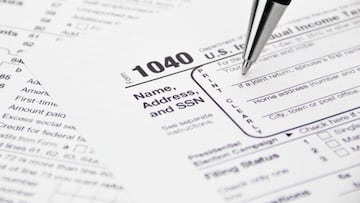Tax Filing 2021 deadline: is it possible to request an extension?
Taxpayers have until midnight to request an extension to file a tax return by 15 October, but any taxes owed will need to be paid before the deadline.

Tax Day normally comes every 15 April, but again for a second year due to the pandemic and recent adjustments to the tax code to help struggling American households the filing date was pushed back. Taxpayers who owe taxes and haven’t filed their 2020 tax return will need to take action before midnight or face penalties from the IRS.
Those that still need time to get their papers in order can file for an extension, but only have until midnight to do so. If they miss the deadline and owe taxes, they will want to act fast to avoid accumulating interest and penalties.
Also see:
- When to expect your tax refund in 2021
- Can I still file my taxes on Monday 17 May?
- Which states have extended their deadline?
- Filing a tax return could earn you an extra stimulus check
How to file for a tax extension from the IRS
Individuals who would like an extension can do so by submitting “Form 4868” before midnight 17 May according to the IRS. This can be done through your tax professional, tax software, using the IRS’ Free File or by mail.
Using IRS Free File, a partnership between the IRS and Free File Alliance providing access to free, name-brand tax preparing software, taxpayers can request an extension. You will need to follow the program’s instructions to electronically file for an extension to have the filing deadline postponed to 15 October, 2021. Once the request has been made the IRS will send you a message to acknowledge that the form was submitted correctly. The Free File service is available to any taxpayer who has earnings of less than $72,000 annually to file for free, but the software is available to those with earnings above the threshold.
#IRSTaxTip: File your tax return on time, even if you can’t pay your tax bill in full, to avoid interest and penalties. See: https://t.co/khvZenk5pZ #IRS pic.twitter.com/oZLkIh4ruj
— IRSnews (@IRSnews) May 17, 2021
If you choose to send the application for a tax extension by mail, you will need to fill out Form 4868 on paper and have it postmarked on or before 17 May, 2021. You will want proof that you mailed it in time to avoid a late-filing penalty from the IRS.
Even though you ask for more time to file your tax return that doesn’t mean you get an extension on any underpayment of taxes during the year. You will need to estimate any money that you owe to IRS and pay that sum by 17 May, failure to do so will incur interest and penalties. If you are unsure about how to make an estimate, always contact a tax professional.
What penalties can I expect if I miss the deadline?
If you miss the filing deadline, 17 May this year the IRS can impose a failure-to-file penalty of 5% minus the failure-to-pay penalty when both apply, on any underpayment of taxes for each month, or part thereof, that a tax return is late. The penalty will max out five months after Tax Day and won’t exceed 25%. The minimum failure-to-file penalty of $435 or 100% of the tax required to be shown on the return, whichever is lesser, will be applied if your return is over 60 days late. The late filing penalty is calculated based on the tax that remains unpaid after 17 May or, if an extension is granted, after 15 October.
Trying to resolve a tax debt? If you want to see if you qualify for an #IRS Offer in Compromise before filling out the paperwork, check this Pre-Qualifier tool. https://t.co/QHYYwoePqQ pic.twitter.com/FOHqBBJ5Bp
— IRSnews (@IRSnews) May 17, 2021
Penalties for tax balances will start to accrue after 17 May. The failure-to-pay penalty is 0.5% of the unpaid taxes per month, with a cap of 25%. Even if the failure-to-file penalty has maxed out, the penalty for failure-to-pay will continue to apply until the maximum rate of 25% is reached.
Related stories
In addition to the penalties, the IRS will start charging interest on any unpaid balance of taxes owed which will accrue and compound daily from 17 May until the balance is paid in full. The current interest rate for underpayments is 3% which is calculated using the federal short-term rate plus three percentage points. Any outstanding penalties will also accrue interest while they remain outstanding so it is vital that you complete your tax return on time.
In the event that you are owed a refund, the longer you wait to file the longer it will take to get your money back from the government. Taxpayers have a maximum of three years from Tax Day to claim any refund that they have coming to them before it gets lost to the government for good. This year it is more important than ever to file a tax return to take advantage of all the tax provisions included in the American Rescue Plan, including getting any stimulus check money still owed to you and to participate in the enhanced Child Tax Credit that will begin sending families monthly payments 15 July.
- IRS
- Crisis económica coronavirus Covid-19
- Ciencia
- Coronavirus Covid-19
- Crisis económica
- Hacienda pública
- Impuestos
- Estados Unidos
- Pandemia
- Coronavirus
- Recesión económica
- Tributos
- Norteamérica
- Coyuntura económica
- Virología
- Epidemia
- Enfermedades infecciosas
- Finanzas públicas
- Microbiología
- Enfermedades
- América
- Medicina
- Economía
- Finanzas
- Biología
- Life sciences


